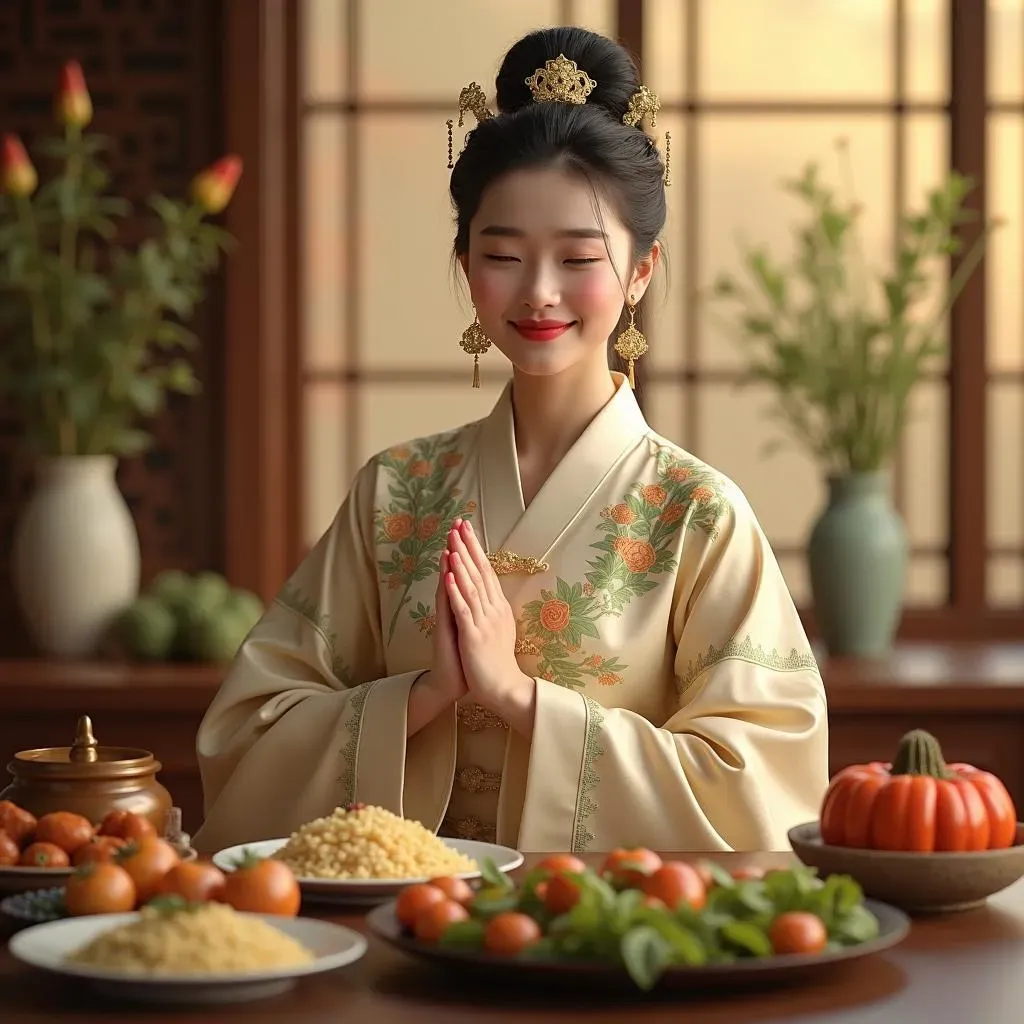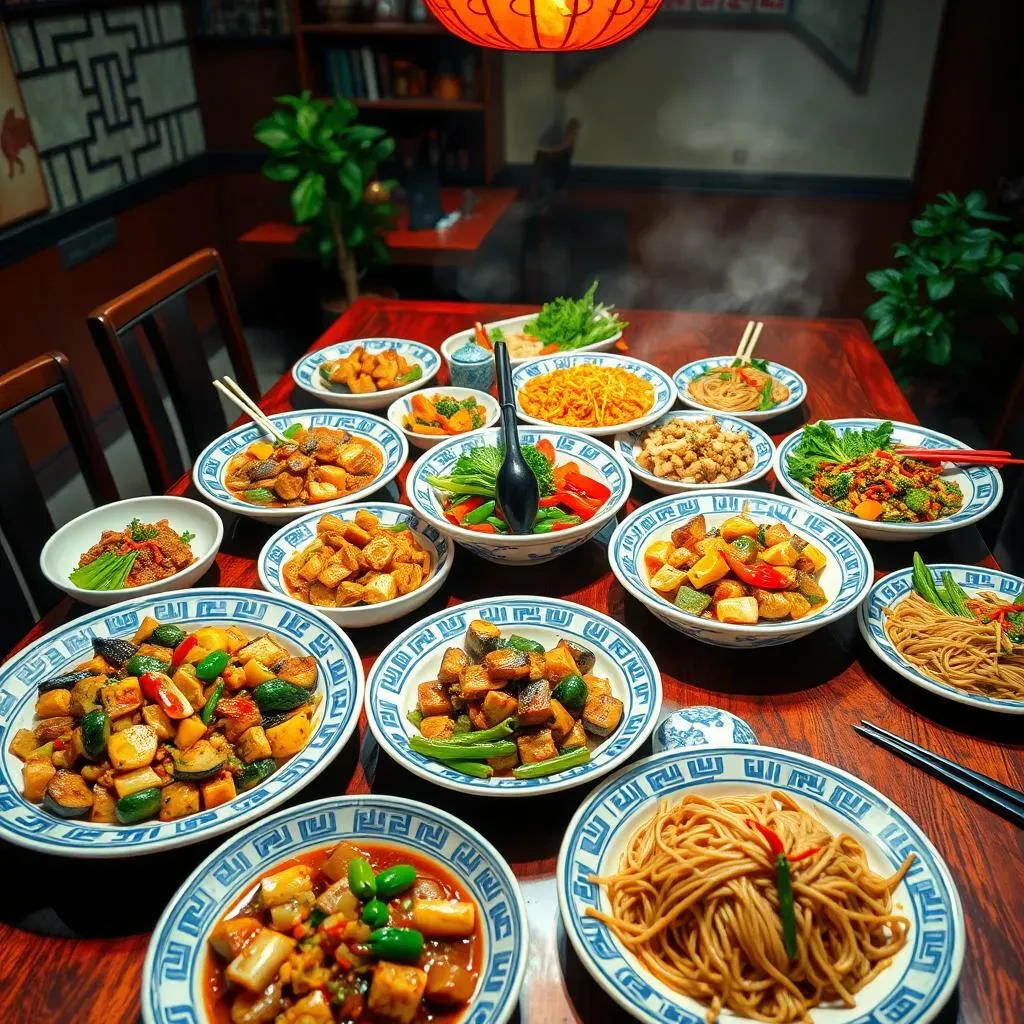Table of Contents
Thinking of traveling to China but worried about finding vegetarian food? You're not alone. Many people wonder if it's even possible to stick to a meat-free diet in a country famous for its diverse and often meat-heavy cuisine. The good news is, it’s totally doable! But it does require a bit of know-how. This article isn't just a list of dishes; it's your survival guide to navigating the world of "vegetarian food in chinese language." We'll explore how cultural views on vegetarianism differ from the West, teach you essential Mandarin phrases to confidently order your meals, and introduce you to some mouthwatering vegetarian dishes you absolutely must try. From understanding the history behind plant-based eating in China to mastering the art of asking for “no meat,” we've got you covered. So, get ready to embark on a delicious adventure, because eating vegetarian in China is not just possible, it’s an exciting culinary journey waiting to be explored. Let’s dig in!
Navigating Vegetarian Food in Chinese Culture
Navigating Vegetarian Food in Chinese Culture
The "Vegetarian" Puzzle
So, you're thinking about going vegetarian in China? Awesome! But here's the thing: what we consider "vegetarian" isn't always the same as what they consider "vegetarian" in China. It's not that they're trying to trick you, it's just a different way of thinking about food. Sometimes, a dish might be labeled as vegetarian, but it could still have things like fish sauce or oyster sauce in it. Even the broth in a soup can be made with meat. It's like a secret ingredient that they might not even think of as "meat". It's not malicious, but it is something to be aware of. I remember once ordering a "vegetarian" noodle dish, only to find tiny bits of dried shrimp hiding in the sauce. It wasn't a pleasant surprise, let me tell you!
Meat as a Status Symbol
Now, let's talk about meat. For a long time in China, meat was a luxury, something that only the wealthy could afford. This has changed a lot with economic growth, and now meat is a symbol of prosperity. It's like saying, "Hey, I've made it!" So, when you say you're vegetarian, it might be seen as a bit odd or even a little bit sad. It's not that people don't like vegetarians, it's just that they might not understand the idea of choosing not to eat meat when you can. This isn't always the case, of course, but it's a good thing to keep in mind. Don't be surprised if someone offers you meat, even after you've said you're vegetarian, they're probably just being friendly and trying to share their food with you.
A History of Plant-Based Eating
Here’s a cool bit of history for you: vegetarianism in China actually has a long and interesting past. It goes way back to the Han dynasty and was influenced by Buddhism and Taoism. Monks and nuns often followed a vegetarian diet as part of their religious practice, and this tradition has carried on to today. There are even vegetarian restaurants associated with Buddhist temples, which sometimes have some of the best vegetarian food you'll ever taste. It’s not just some new trend; plant-based eating has deep roots in Chinese culture. It’s about more than just not eating meat; it's often tied to spirituality and well-being. So, while the idea of meat as a status symbol is relatively new, the practice of vegetarianism has been around for centuries.
Cultural Aspect | Description |
|---|---|
Religious Influence | Buddhism and Taoism have historically promoted vegetarianism. |
Historical Context | Meat was once a luxury, making vegetarianism a common practice. |
Modern Perspective | Meat is now a status symbol, but vegetarianism is still practiced. |
Key Mandarin Phrases for Vegetarian Dining
Key Mandarin Phrases for Vegetarian Dining
Essential Terms
Okay, so you're ready to tackle the menus, right? The first step is learning some key phrases. It's like unlocking a secret code to vegetarian heaven! You'll want to know how to say "vegetarian," of course, which is 我吃素的 (wǒ chī sù de). That literally translates to "I eat vegetarian." It's a great starting point. Another really important word is 素 (sù), which means vegetarian. You'll see this on menus a lot, so it's good to keep an eye out for it. It can be a life-saver, trust me! And don't forget the basics like "I don't eat meat" which is 我不吃肉 (wǒ bù chī ròu). It’s direct and to the point. Knowing these terms will make a huge difference, and don't worry if your pronunciation isn't perfect, people will appreciate the effort.
Think of it like this: you wouldn't go to a mechanic and start talking about plumbing, would you? Same with food in China. You need the right vocabulary. It really does make a difference. Also, learning the word for "vegetables" 蔬菜 (shū cài) is super useful. You can point to them on a menu, and people will understand that you're looking for veggie options. It might sound daunting, but once you get the hang of it, it's actually quite fun. It's like being a secret agent, but instead of solving mysteries, you're ordering delicious food.
Useful Phrases
Now that you know the basic terms, let's level up with some useful phrases. When ordering soup, a critical phrase is 请用白开水煮汤 (qǐng yòng bái kāi shuǐ zhǔ tāng), which means "Please use water as the soup's broth." This is crucial because broth is often made with meat or bone in China. Another great one is 请不要放肉 (qǐng bù yào fàng ròu), which translates to "Please don't put meat." It's polite and clear. And if you're feeling adventurous, you can ask, 这个菜有肉吗?(zhè ge cài yǒu ròu ma?), meaning "Does this dish have meat?" It’s a direct question that can help you avoid any meaty surprises.
Don't be shy about using these phrases. Most people in China are very friendly and helpful, and they'll appreciate you making an effort to speak their language. Remember, it's okay to make mistakes. I once accidentally ordered a dish with "extra meat" because I mixed up my tones. It's a great story now, but at the time, it was a bit of a learning experience! The key is to be confident and to try your best, and most importantly, to keep a sense of humor about it. If you can manage that, you'll be eating delicious vegetarian food in China in no time.
Phrase | Pinyin | Meaning |
|---|---|---|
我是吃素的 | wǒ chī sù de | I am a vegetarian |
我不吃肉 | wǒ bù chī ròu | I don't eat meat |
请用白开水煮汤 | qǐng yòng bái kāi shuǐ zhǔ tāng | Please use water as the soup's broth |
请不要放肉 | qǐng bù yào fàng ròu | Please don't put meat |
这个菜有肉吗? | zhè ge cài yǒu ròu ma? | Does this dish have meat? |
Delicious Vegetarian Dishes in China
Delicious Vegetarian Dishes in China
Beyond Tofu: A World of Flavors
Alright, let's get to the good stuff – the food! Forget any ideas you have about boring vegetarian meals, because Chinese cuisine is a playground for plant-based cooking. We are talking about dishes that are not just meatless, but are bursting with flavor and textures that will make your taste buds dance. One of the things that makes Chinese vegetarian food so exciting is the variety of vegetables and spices they use. From stir-fried eggplant with garlic sauce to cold tossed cucumbers in sesame oil, there's a whole world of deliciousness waiting to be discovered. It's not just about replacing meat; it's about creating something amazing with what you have. And trust me, they do it really well.
I remember the first time I had braised bok choy with mushrooms in a small restaurant in Beijing. The flavors were so rich and complex, I couldn't believe it was all vegetables! It was a real eye-opener. It showed me that you don't need meat to create a satisfying and delicious meal. It's like they've got this secret cookbook of flavor combinations that we're just starting to get a glimpse of. And these aren't just fancy restaurant dishes; you can find amazing vegetarian food in small local eateries, street stalls, and even in people's homes. It’s everywhere if you know where to look. It's all about being open to trying new things and exploring the variety that's out there.
Must-Try Vegetarian Dishes
So, what should you be looking for on the menu? Well, for starters, you absolutely have to try 地三鲜 (dì sān xiān), which translates to "three treasures of the earth." It's a stir-fry of eggplant, potatoes, and green peppers, and it’s absolutely delicious. Another great one is 麻婆豆腐 (má pó dòufu), which is a spicy tofu dish that's both flavorful and satisfying. It’s a classic for a reason, and it's often vegetarian, but always double-check. Then there's 凉拌黄瓜 (liáng bàn huáng guā), which is cold tossed cucumbers with garlic and sesame oil. It's super refreshing, especially on a hot day. And don’t forget about all the amazing noodle dishes, like 素炒面 (sù chǎo miàn), which are stir-fried noodles with vegetables.
The key to enjoying vegetarian food in China is to be adventurous. Don't be afraid to try dishes that you've never heard of before. Ask the restaurant staff for recommendations, and be open to new flavors and textures. You might be surprised at how much you enjoy them. It's like going on a culinary scavenger hunt, and the reward is a delicious meal that's both healthy and satisfying. I've found some of my favorite dishes by just pointing at something on the menu that looked interesting. And even if you don't know what it is, it's always a fun surprise. Plus, it's a great way to learn more about Chinese cuisine and culture.
Dish Name | Pinyin | Description |
|---|---|---|
地三鲜 | dì sān xiān | Stir-fried eggplant, potatoes, and green peppers |
麻婆豆腐 | má pó dòufu | Spicy tofu dish |
凉拌黄瓜 | liáng bàn huáng guā | Cold tossed cucumbers with garlic and sesame oil |
素炒面 | sù chǎo miàn | Stir-fried noodles with vegetables |